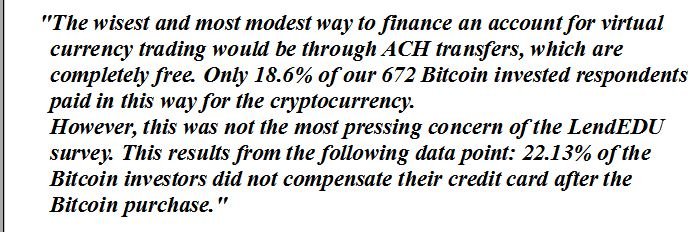
- Confusion about South Korea - Is there a Bitcoin Ban coming?
- Monero: Malware mines for University in North Korea!
- Microsoft Store accepts Bitcoin again!
- Bitcoin Study: 22% of Investors gamble with borrowed Money!
- Kodak develops a Cryptocurrency and Blockchain Solution for Photography Rights!
- Crypto Valley Association: ICO Code of Conduct!
- Israel Central Bank rates Cryptocurrencies as Assets!



Since the early hours of the morning, there is a message that the South Korean government wants to set up a law to ban the trade of Bitcoin and other cryptocurrencies.
South Korea bans Bitcoin - that's how it sounded today from many different sides. The reason for this was the statement of the South Korean Justice Minister Park Sang-ki to publish a law that is intended to ban trade in cryptocurrencies in the country. Since the South Korean government has strong concerns about digital currencies, his ministry is already preparing such a law. This is done in close cooperation with the Ministry of Finance and the Korean regulatory authority.
At first, these events are reminiscent of the situation in China in September last year. The government of the People's Republic, in co-operation with the Chinese central bank PBoC, had initially banned initial coin offerings and reluctantly relinquished them a week later, announcing a closure of China-based crypto exchanges. The ICO ban on the Chinese model quickly made South Korea's own, so now the East Asian state seems to be thinking about the second part of the "China bomb".
Then as now, the market was sensitive to the news and almost red throughout. However, the fall today is far from being as extreme as it was in September. At that time, prices fell by a row by 30-50%, whereby the market lost one third of its capital, the current case is very moderate and holds in most cases in the single-digit minus range. In addition, you can not compare today's market capitalization with the then, since since September a lot has done in the crypto market.
Nonetheless, South Korea remains an important market for cryptocurrencies, with an estimated up to 20% of global crypto trading being conducted in Korea, with Bithumb or Coinone having global exchanges on the peninsula. The impact of the South Korean market has recently been painfully experienced by Ripple, whose share price plummeted after the Korean market volume of Coinmarketcap was taken out of the equation.
However, there are increasing signs that the announced regulation may turn out to be less severe than it is now being hyped up medially. Not only are the courses currently recovering, but there is also the question of what the general announcement of a Minister of Justice actually means. Unlike China, South Korea is not an autocratic-run one-party state, but has a parliament that passes laws. In addition, a precise design of the law does not yet exist, which is why it is not yet known what a possible restriction of the trade in cryptocurrencies should look like at all. Also, the role of the South Korean Ministry of Finance does not seem to be clear - local media reports that officials of the Ministry of Finance would not support the proposals of the Minister of Justice. Already in December, the option of a crypto ban was on the table - but it was decided against.
And finally, the comparison with China seems not so scary: After the prohibition of crypto exchanges in the People's Republic, the largest exchanges settled in the neighboring Hong Kong Special Administrative Region, from where the trade of and with cryptocurrencies could continue as usual. Recently, even a court ruling in China caused a stir, which gave people in China the right to act cryptocurrencies. Reason enough to look forward to the latest news from South Korea.


A malware created at Christmas is currently spreading all over the world. The executable program mines the crypto currency Monero on the target computers and tries to send the credit to the Kim Il-sung University in Pyongyang. However, as the security researchers at AlienVault report, this fails in most cases.
So far it is unclear whether it is actually North Korean hackers or if someone is just trying to make it look that way. As AlienVault reports, the transfer of the scrapped Monero credit has so far failed because the host registered in the source code is unknown. The installer may initially run exclusively on a locked network, the address of the target computer may no longer exist, or, most likely, someone is trying to deceive the security researchers and make it look as if North Korea is behind the new malware attack.
It could also be that it is an early beta version of the program that was unintentionally distributed on the net. Or the mining on the target computers happened with the consent of the owners of the computers. All this would at least explain why the scrapped credit can not be successfully sent to North Korea's Kim Il-sung University in Pyongyang. Even the password used by the hackers "KJU" is clearly aimed at North Korea, because these are the first letter of the ruler Kim Jong-un. However, it is questionable why the hint should be placed so clearly.
In view of the economic sanctions, the use of cryptocurrencies is of great interest to North Korea. Especially when using Monero nobody can follow the trail of money. According to media reports, North Korea is currently focusing on hacking wallets to gain assets. The South Korean secret service has repeatedly stated that North Korea is involved in cyber attacks on South Korean online trading venues. The most recent victims are the trading venues YouBit and bithumb, to name but two examples. Also suspected are the North Korean hacker groups Bluenorroff and Andariel, which have installed after the successful acquisition of several company servers there first malicious software for mining by Monero. With the current malware these attacks have nothing to do. The currently widespread installer was programmed quite amateurishly in Visual Basic, according to AlienVault. According to the security researchers, this approach does not look similar to any of the aforementioned hacker groups.


After Microsoft again exposed Bitcoin as a means of payment in the in-house store a few days ago due to a lack of stability, it will now be accepted again. This was the third time after 2015 and 2016 that you could not pay with Bitcoin at short notice in the Microsoft Store.
The software company from Redmond actually has a leading role, accepted in the Microsoft Store Bitcoin since 2014. The last break during the week was filed according to official figures due to the enormous price fluctuations. It has now reintroduced this cryptocurrency in cooperation with the payment provider, a recent press request has been returned. Microsoft was beside the lack of stability of the Bitcoin course also the high costs and the long duration of the transfers a thorn in the eye. And although Bitcoin's market share fell from 87% to 36% last year, most vendors are refraining from accepting other cryptocurrencies as a means of payment.
On the contrary: More and more companies prefer to pay more on this issue, such as the online games platform Steam, which turned off the Bitcoin in December of last year. Operator Valve also cited the high transaction costs and the enormous instability of the price as reasons for the end. Let's hope that Microsoft will continue to stick to its current course. Incidentally, cryptocurrencies are currently not available to German customers, although the company's support page still explains how to add credits to Bitcoin's Microsoft account. It is still unclear how long this condition will last.


Bitcoin trading on credit? According to LendEDU, a private-credit research firm, more than 18% of Bitcoin users have used borrowed money to trade in the cryptocurrency.
In a global survey of 672 active Bitcoin investors, the researchers asked about their method to finance their accounts for cryptocurrency trading. The majority of investors used banking systems such as credit cards and ACH transfers [1] to finance their accounts.
According to LendEDU, a private-credit research firm, more than 18% of Bitcoin users have used borrowed money to trade in the cryptocurrency. In a global survey of 672 active Bitcoin investors, the researchers asked about their method to finance their accounts for crypto currency trading. The majority of investors used banking systems such as credit cards and ACH transfers to fund their accounts.
However, 22% of traders said they had not paid off their credit cards after buying Bitcoins, effectively investing in the cryptocurrency with borrowed money.
The report stated:
Criticism of the study: Exaggerated generalization
Whether this study really has meaningful, remains to be doubted. If you see a lot of new registrations the Bitcoin exchanges currently record, were taken with just under 700 respondents a far too small sample.
Recently, Binance, a popular cryptocurrency exchange, announced that it would add more than 250,000 active users daily, as a result of which it would have to temporarily stop accepting new users. Coinbase and Bitstamp also received more than 100,000 daily users, and at the time of reporting, Coinbase's user base was just under 20 million.
In early December, Bitstamp co-founder and CEO Nejc Kodrič announced the following:
On the other hand, just under 700 Bitcoin users are not nearly enough to make generalizations across the entire global Bitcoin and cryptocurrency market.
It is important to note that a small number of Bitcoin investors are still trading cryptocurrency, despite unpaid debt, although experts and analysts advise against it.
Tip: Only invest money that can be lost!
In June, Bitcoin and security expert Andreas Antonopoulos strongly advised that they only invest a fortune in cryptocurrencies that they are ready to lose, which has to do with the significant risk involved in cryptocurrency trading. While the risk of investing in Bitcoins, as opposed to its size, is lower, the risk to other cryptocurrencies in the global market remains very high.
Andreas Antonopoulos said:
At a presentation at Coinscrum, an event run by the Imperial College of London, Antonopoulos also stated that he could lose all of his investments in cryptocurrencies and yet he would be left out of anything because of his career, his intellectual abilities, and his work in Bitcoins and the Invested in the cryptocurrency market.
For occasional investors and newbies, it is extremely risky to owe debts to invest in a particular asset - and that does not apply to Bitcoin alone. No matter what asset: being at risk to invest in a particular asset or asset class is extremely risky.


Kodak, a well-known manufacturer of photographic equipment, is planning to launch a blockchain initiative and an ICO to launch on January 31, in partnership with fintech company Wenn Digital.
In the foreground, the multinational corporation Kodak, which has been operating since the 1890s, is planning a blockbuster technology-based revenue stream for photographers, as well as a platform for securing data on their rights.
As announced in an official statement the day before yesterday, they want to collaborate with Wenn Digital. The platform should therefore be called KodakOne and their launch should go hand in hand with the launch of the KodakCoin. In interaction, the platform and the coins should facilitate the management of rights to photographs and their sale.
Kodak wants to protect property with the blockchain
In addition, the companies promise better protection of the property of the photographers. The platform is intended to regularly and automatically search the Internet to forestall the unlicensed use of photographs. In such incidents, the platform should then act in such a way that the rights to the images are still valid in hindsight. The respective originators then receive their respective remuneration with retroactive effect.
Kodak-CEO Jeff Clarke said:
The use of blockchain data storage technology is recognized and used in a variety of sectors. In addition to the common uses such as the (international) trade or the (Australian) stock exchange, now follows the photography. Other exemplary applications include the storage of academic degrees or the management of health records. Others will follow with certainty.


The Swiss-based Crypto Valley Association announced on January 9, 2018, the issuance of a Code of Conduct for Initial Coin Offerings. This should provide guidelines for the implementation of and participation in ICOs and bring the fund-raising method so even greater stability in the canton of Zug and throughout Switzerland.
The Crypto Valley Association (CVA) is a Swiss society committed to promoting the development of blockchain and cryptocurrencies as well as their adaptation in Switzerland. Based in the Canton of Zug, also known as Crypto Valley, the CVA, which is also supported by the government, is pursuing the goal of establishing a globally leading blockchain ecosystem in Switzerland.
In the course of these efforts, the announcement is also to be issued to publish a Code of Conduct, which is to regulate all relevant questions on the subject of Initial Coin Offering. In addition to all legal aspects, this includes moral classification and questions of security. Among other things, companies preparing an ICO are encouraged to be transparent about the entire process and to explain their intentions in an understandable way. It should be clear how the money raised by the token sale will be used and how the offered token will work within the ecosystem.
CVA President Oliver Bussmann explains:
Already last year, I was struck by the Crypto Valley as one of the most innovative Blockchain hubs in Europe. Between 50 and 100 blockchain start-ups are estimated to be located throughout the canton. Reasons for Zug's attractiveness include the low corporate tax burden coupled with a regulatory framework that relies more on the forces of the market than on the power of the state, and refrains from exorbitant regulation of the blockchain sector.


At the Knesset Finance Committee Meeting on Monday, Dr. Ing. Nadine Baudot-Trajtenberg commented on cryptocurrencies on behalf of the Israeli central bank. Thus, the central bank of Israel assesses cryptocurrencies as assets. An example of the clash of institutions and the ideal of decentralization.
States, their banks and decentralization - a triad that still has no harmonious relationship. Shortly after the Bank of England dropped its own cryptocurrency and authorities in China attacked cryptocurrency mining, the Israeli central bank deals with definition issues. This is primarily a reaction to frequent inquiries from bank customers who had problems exchanging fiat and cryptocurrencies. According to the Central Bank's assessment, cryptocurrencies are assets.
The Central Bank of Israel classifies cryptocurrencies as assets
As the press release shows, cryptocurrencies are neither domestic nor foreign currency. Therefore, they were defined as assets. In addition to legal issues of definition, the representative of the Central Bank also expressed a lack of confidence in cryptocurrencies:
According to the central bank of Israel, none of these characteristics apply to cryptocurrencies. These are much more characterized by their volatility, complexity in payment transactions, and opacity of authorship.
As a result, the central bank believes that there are further problems in dealing with cryptocurrencies. The dangers are well known: money laundering, drug trafficking and terrorist financing. Therefore, banks that facilitate the transfer of fiat into cryptocurrencies could be held responsible for their use.
Central Bank of Israel only provides guidance for individual banks
In this official statement, however, the deputy emphasizes that it remains on an assessment. Ultimately, it is up to each bank in Israel to decide how to deal with these risks. However, precautionary measures must always be taken to prevent money laundering and the financing of terrorism. This includes monitoring transactions with large sums of money. The banking supervisory authority has already set up its own team, which has already started its work.
1380/5000
The statement concludes that there is not much that can be learned from international regulatory approaches, as there are no consistent guidelines for trading cryptos in relation to clients. As a result, customers who are denied exchanges of fiat and cryptocurrencies by banks can not give a universal answer. If there was a solution, it would have to be agreed with the Israeli Authority for Prevention of Money Laundering and Terrorist Financing.
Clash of institutional structures and decentralization
What happens here is the (now almost classical) clash of centralized structures and the ideal of decentralization. On the one hand we have an institutional authority, on the other hand a - more or less - decentralized technology. The fact that they are struggling with the same problems strictly speaking sometimes seems to be ignored. Because there is money laundering and terrorism not only since 2008 and that in Satoshi Nakamoto's white paper is nothing about drug trafficking is hard to refute.
However, what you can also see between the lines of the press release are signs of powerlessness on the part of the other side. On the one hand, there are people who demand clear guidelines from the Israeli central bank but can not provide them.
Rather, they make recommendations and give the final responsibility in the hands of individual banks. In the international review, one sees only another lack of orientation, which leads to a shift of responsibilities to the individual instances - a phenomenon that can certainly be described as decentralization.
In case you missed my last news just click here!

I wish you all a lovely Thursday!!!
ⓁⓄⓥⒺ & ⓁⒾⒼⒽⓉ
Best regards
@danyelk
.gif)









The last part of today post is very interesting, Thanks
Hi @denyelk where have you being?... Hardly see your post I wonder why. Hope you are good. Thank you for the info.
Thanks I am good. I have been here all the time just not on the 1,2,3,4 January :)
It's danyelk ;)
That's a nice summary for anyone who have less time to get all important news. Great going!
Your welcome :)
We got a lot of news about the crypt. Which gave me a good idea about some coins. This news is a lot better for us.
thanks for sharing @danyelk
Your welcome :)
many many thanks for sharing essential crypto news. keep it up
Your welcome and yes I will keep it up ;)))
This post has received gratitude of 1.95 % from @appreciator thanks to: @danyelk.
very informative and interesting article.
Thanks dear @danyelk
thats the positive signs bans will not heart cryptos @danyelk
thanks for sharing following you
Yup I they get banned they go somewhere else.
Thanks for follow :)